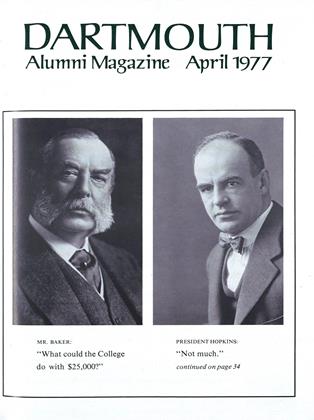In the 25 years which include, and are bracketed by, Richard Eberhart '26 and Robert Pack '51, Dartmouth graduated some considerable poets. None is more remarkable than William Bronk '38, whose work continues to be as individual as it was when Sidney Cox first found him as a student.
Now, nNow newly, in one of the graphically distinguished limited editions printed in Italy under the colophon of The Elizabeth Press, William Bronk has risked publishing a collection of poems which, in composition, preceded by as many as 17 years the publication of his first book, Light and Dark, in 1956. Few poets have the late courage to make public their early work. But the evidence of promise which Cox saw in Bronk has not only been fulfilled by his later books; My Father Photographed WithFriends is remarkable in its own right. Little in the earliest poems of William Carlos Williams, for instance, or in the undergraduate work of Wallace Stevens, approaches the ironic assurance of "The Spies" or the moral perspective implicit "On a Course Known Backwards."
As if to confirm his refusal to be fashionable, his total disinclination to play verbal games, William Bronk has also just published some 67 flatly unrhymed quatrains under the paradoxical title of Finding Losses. In these poems which make a paradox of both selflessness and love, Bronk typically refuses to reduce the processes of his thought to aphorism or epigram. Sometimes Frostian in the more formal meters of his first poems, Bronk's increasingly open voice is now distantly reminiscent of Jeffers' barest lyrics. "The Late Agnostic," from title through all four lines, says the straight-out irony of the God-seeker every poet partially is. My own preference among Bronk's poems is for those which give his voice more room to speculate. But God must be mightily pleased with a poet who can title a short poem with the long, if self-definitively incomplete, knowing that "Pride, Which Goes Not Only Before But Behind And Probably Sideways Too...."
Bronk's poems seldom fall or fail from pride, simply because they endure their own isolations with such sure humility. With the wisdom of a stoic who knows the humors of his stoicism, poem after poem gives voice to intensely lonely reflection. Wry, human, the thinker thinks aloud his anger, his yearning, his acceptance of what is. "Where Are We" he asks, without question mark; especially in the 15 poems of The Meantime, Bronk realizes, and makes realizable, that "We can never know what we want to know." But all the same "The world is beautiful;" it is to the abstract whole that we take "our naked pleas" because - even if seemingly beyond us as in "the distances of space" - "It is all there" to support our being and validate our wonder. Taken from the tensile strength of his poems, said flat, such quotations only superficially measure the depth of Bronk's work; as "In April," the logic of his rhythms, the movement of his thought, demandingly insist: "Li6sten, I am talking to you."
Very few poets have so identifiable a voice; no poet now writing speculates more abstractly, or asserts so much on faith. A loner even among the lonely crowd of contemporary poets, William Bronk is definitively his own man: a philosophical poet who also has the self-saving wit of a spy in alien territory. As he continues to report a life lived among lives of quiet desperation, Bronk continues to demonstrate how remarkably early he came to the tones and themes that now bear his hallmark:
Withhold conclusions on my last report;I'll try to send again in two days more.I begin to suspect some things of a different sortfrom what I spoke with you about before.But this is such an elusive country here,I wonder that we hope to get it clear.
From just such an early poem until now, "here" for William Bronk has been Hudson Falls, as well as the here we all inhabit. The wonder of Bronk's mature poems is that - in presenting, and claiming to know so little of what is elusively immediate - they leap with such clear constancy to knowledge of "the nameless name" that men call God. However short of total knowledge (or total love in this mean time or meantime), William Bronk redeems losses: he makes poems full of wonder.
MY FATHER PHOTOGRAPHEDWITH FRIENDSFINDING LOSSESTHE MEANTIMEBy William Bronk '38The Elizabeth Press, 197640 pp., 75 pp., 23 pp.; $8, $8, $5
Philip Booth writes poems in Maine, andprofesses poetry at Syracuse University.
 View Full Issue
View Full Issue
More From This Issue
-
 Feature
FeatureAffirmative Action
April 1977 By MARY ROSS -
 Feature
FeatureMr. Hopkins Builds a Library
April 1977 By CHARLES E. WIDMAyER -
 Feature
FeatureIf you spent the winter in Buffalo, Imagine This
April 1977 By THOMAS SHERRY -
 Feature
FeatureThe Road Not Taken
April 1977 By JOHN S. MAJOR -
 Article
ArticleBetween Seasons
April 1977 By JACK DEGANGE -
 Article
ArticleTopeka Takes On the Hun
April 1977 By NICK SANDOE '19
PHILIP BOOTH '47
-
 Letters to the Editor
Letters to the EditorLetters
January 1954 -
 Letters to the Editor
Letters to the EditorLetters to the Editor
September 1976 -
 Article
ArticleRobert Frost '96, Non-Graduate
May 1954 By PHILIP BOOTH '47 -
 Books
BooksRICHARD HOVEY — Man and Craftsman.
April 1957 By PHILIP BOOTH '47 -
 Article
ArticlePreoccupation: Poetry
MARCH 1959 By PHILIP BOOTH '47 -
 Article
ArticleResonance
OCTOBER • 1986 By Philip Booth '47
Books
-
 Books
BooksNEW PLANS FOR OLD TOWNS
April 1943 By Albert S. Carlson -
 Books
BooksDR SCARLETT:
November 1936 By H. M. Dargan -
 Books
BooksVERMONT ALBUM: A COLLECTION OF EARLY VERMONT PHOTOGRAPHS
December 1974 By JOHN HURD '21 -
 Books
BooksDeviationist
JUNE 1966 By JOHN PARKE '39 -
 Books
BooksNotes on a humanizing craft, a National Book Award, the Adamses, Avant-garde dancers, Irving Howe's tribute, and the Texas nation.
June 1976 By R.H.R. -
 Books
BooksBASIC DATA OF PLASMA PHYSICS.
January 1960 By WM. P. DAVIS JR

